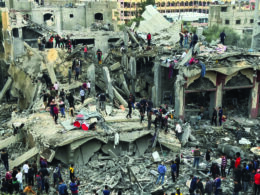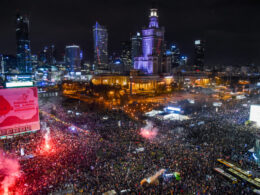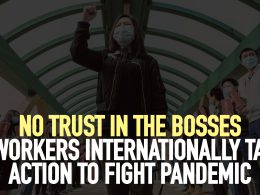Italy saw an unprecedented wave of pro-Palestinian mobilisation after Israeli Occupying Forces intercepted the international aid flotilla. The working class, with support from major trade unions including the CGIL and USB, called a nationwide general strike in protest against Israel’s genocide in Gaza and in response to the Israeli navy’s interception of the Global Sumud Flotilla vessels bound for this occupied territory.
By Friday, 3 October, the Israeli military had intercepted all of the 43 vessels and detained around 500 activists on board. The Global Sumud flotilla carried a mix of humanitarian workers, trade unionists, and political figures from across Europe, including several Italian and Irish parliamentarians, Nobel Peace laureate Mairead Maguire, and international activists, including Greta Thunberg. She, along with the other activists, faced torture during her incarceration.
Italian working class moves into action
Over two million workers joined the action, bringing much of the country to a standstill. Streets, ports, motorways, airports and train stations were shut down as demonstrators denounced their government’s complicity in the genocidal destruction of Gaza.
The general strike spread across Italy, with massive demonstrations and blockades in major cities including Rome, Milan, Naples, Turin, Bologna, Florence, Genoa, Livorno, Salerno, and Bari. In Rome alone, around 300,000 people marched as public transport, schools, and train services were halted. Ports became central to the action – dockworkers in Genoa, Livorno, and Salerno refused to handle ships linked to military cargo. Motorways and toll stations were occupied, access to Venice was cut off, and rail lines across northern cities faced delays and cancellations, causing widespread disruption.
The strike expressed deep frustration and anger at the complicity of the Italian State in the genocide and its support for the Israeli State generally. Decades of state and European Union support for Israel have convinced many that petitioning governments would do little to stop the killing of Palestinians. Instead, Italian workers, students, and grassroots organisers turned to direct action. The flotilla’s interception and the kidnapping of its participants ignited a spark – a clear instance of state repression that revealed the futility of relying on diplomatic channels.
Block everything
For many participants, the strike was not just a protest against foreign policy, but a direct assertion of the working class’s power to intervene where political institutions had failed. Chanting “Blocchiamo tutto” (“Let’s block everything”), the Italian protestors refused to let Italy continue business as usual whilst Palestinians were denied essential humanitarian aid. The strike also served as an expression of deep domestic discontent.
Workers across Italy were united by shared anger at the austerity policies imposed by Giorgia Meloni’s far-right coalition, which has cut funding for public services, frozen wages, and intensified economic insecurity. For many participants, the fight against genocide abroad and austerity at home were inseparable parts of the same struggle against a far-right government seen as prioritising militarism and corporate interests over social welfare and workers’ rights. Italy is the third-largest exporter of weaponry to Israel in the world.
The flotilla raid itself has had global repercussions. The convoy was carrying humanitarian supplies and activists from 44 countries. When the IOF boarded and seized the vessels, solidarity protests erupted on multiple continents. Demonstrations took place in major cities such as London, Paris, Athens, Madrid, New York, and Dublin, with dockworkers and transport unions in several countries refusing to handle shipments linked to Israel. The raid galvanised the international Palestine solidarity movement by offering a concrete event around which people could mobilise. It illustrated the ethos that the working class can challenge the apartheid state when capitalist governments fail to act.
Solidarity in Ireland
Ireland witnessed similar solidarity actions following the interception of the flotilla. On 4 October, there was a national march for Palestine in Dublin, demanding that the government sanction Israel. A section of the National March for Palestine in Dublin broke off and moved toward Dublin Port in order to block access via the Dublin Port Tunnel and the East Wall/North Wall entrances. As protesters approached, Gardaí brutally responded using pepper spray and batons without warning, and arrested two people.
This wave of labour-based resistance to genocide fits within a long global history of solidarity strikes. For example, in 1984, in Ireland, Dunnes Stores employees went on a three-year strike rather than sell produce from apartheid South Africa. During the course of the genocide, workers have taken strike action in France, Greece, Belgium and Catalonia. Workers linked local action to international justice, leveraging their collective power. The Italian strikes are a continuation of this legacy – workers can use economic disruption as political leverage.
A rotten system
These mobilisations must be understood in the context of imperialism, capitalism and settler colonialism. The devastation of Gaza is not an isolated atrocity but part of a broader system of domination that has shaped the modern Middle East. Since the early twentieth century, Western powers have divided and exploited the region to secure strategic and economic control. The establishment and continued arming of Israel serve both as a defence for Western interests and as a mechanism for maintaining access to profitable resources, especially oil and gas. Under this framework, the genocide in Gaza functions as an extreme expression of the same logic that governs capitalist accumulation – violence deployed to protect profit and geopolitical power.
The Italian general strike and the Irish port blockade thus embody a renewed spirit of anti-imperialist internationalism. They show that, in an age of governmental paralysis and humanitarian hypocrisy, the organised working class remains capable of meaningful intervention. As history has repeatedly demonstrated – from the anti-apartheid boycotts to the present – the path to justice often runs not through parliaments or diplomatic channels but through the collective power of those who keep the world’s economies moving.










